Work and property
The Fascist attempt to separate the Jews from the rest of the national community, a policy that was intended to force them to emigrate, is clearly visible in the legislation of the years 1938-1942 on the withdrawal of the right to work. The resulting dismissals caused an impoverishment of Jewish families, worsened by the fact that the poorest ones were denied all State subsidies. This policy began in November 1938 with the expulsion of Jews from all public jobs, ranging from ministries and local government (provinces and municipalities) to public transport companies. Even tram drivers were involved.
The prohibitions also affected those who were employed in various capacities by ‘parastatal bodies and businesses or by private businesses that were controlled or supported by the State’. Clearly, employees of banks of ‘national interest’, along with those working for private insurance companies, were dismissed too.
In 1939, a decree targeted professionals, such as lawyers, notaries, auditors, doctors, veterinary surgeons, pharmacists, midwives, engineers, accountants, architects, surveyors, chemists, agronomists.
Between 1939 and 1942 these prohibitions were extended – sometimes by simply withdrawing licenses – to many other activities, including those considered as more humble: private teachers, street vendors (a common activity in the Rome Jewish community), landlords who let rooms, sellers of holy (Catholic) objects, jewellers, street performers, photographers and breeders of homing pigeons, owners of dance schools, (used) rag and wool sellers, etc.
In 1942, those who worked in private companies considered to be ‘auxiliary to war production’, such as FIAT, Montedison, and shipyards, were dismissed.
As for real property, it was forbidden for non ‘discriminated’ Italian Jews to own land with an estimated value exceeding 50,000 lire and urban buildings with an estimated value exceeding 20,000 lire.
The ‘exceeding’ properties were to be transferred to the Ente Gestione e Liquidazione Immobiliare – EGELI (Agency for the Management and Liquidation of Real Property), an agency created to acquire, manage, and resell properties seized from Jews. In 1940, after Italy entered the war, EGELI was also given the power to seize assets owned by foreigners with an ‘enemy nationality’.
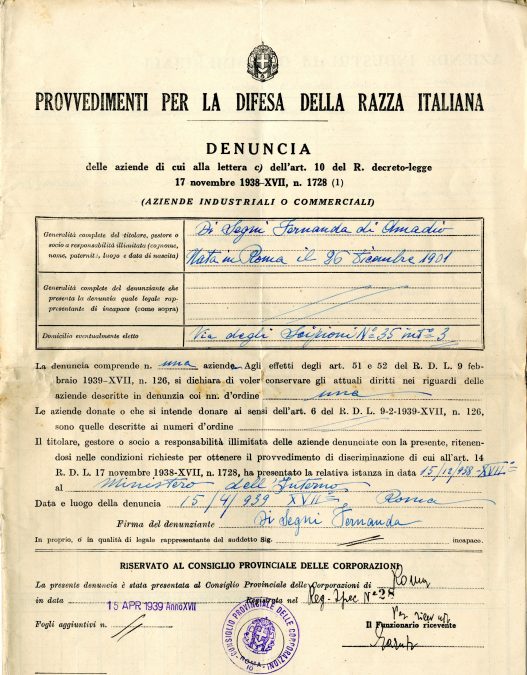
01 Fernanda Di Segni
As a result of Decree-Law of 9 February 1939 (Art. 51-52), Fernanda Di Segni (1901-1967) is forced to ‘denounce’ in a statement the details of her business – retail of socks, haberdashery, and linen in via del Leoncino 12 in Rome. Fondazione Museo della Shoah, Roma...
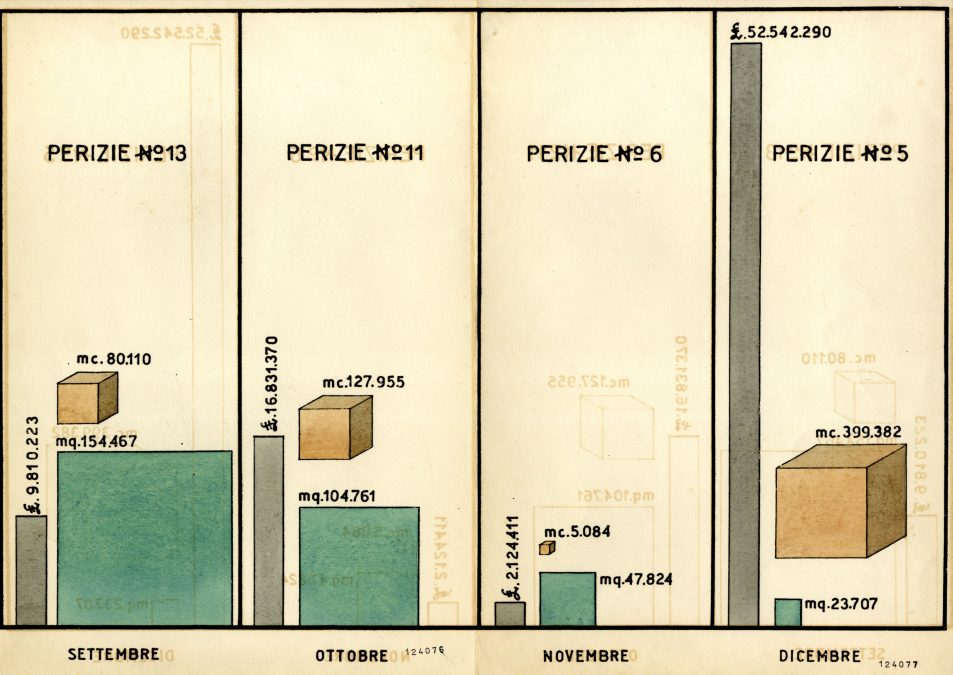
02 Beni
Viewing of the expropriation expertise of money amounts, land, and buildings in Rome in 1939. The institution responsible for the administration of the properties expropriated from the Jews is the newly established Ente gestione e liquidazione immobiliare (Egeli)....
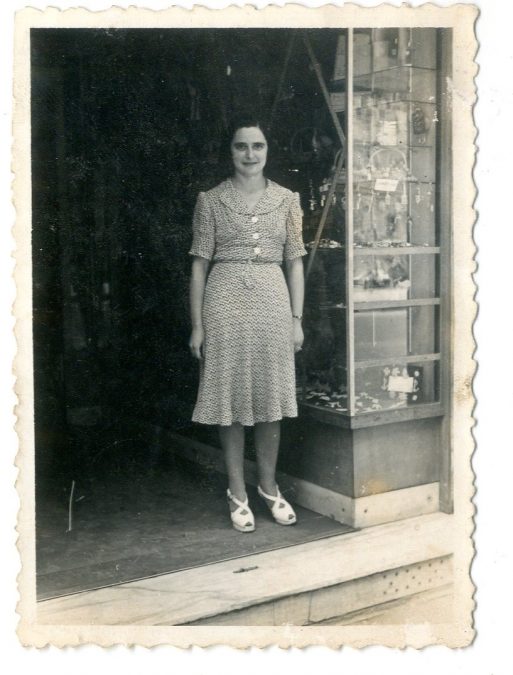
06a Ascarelli
Regina Ascarelli (1907-1964) in front of her shop Fantasie e profumi in via del Corso 80. Lattes-Ascarelli Family Private Archive, Roma / Fondazione Museo della Shoah, Roma
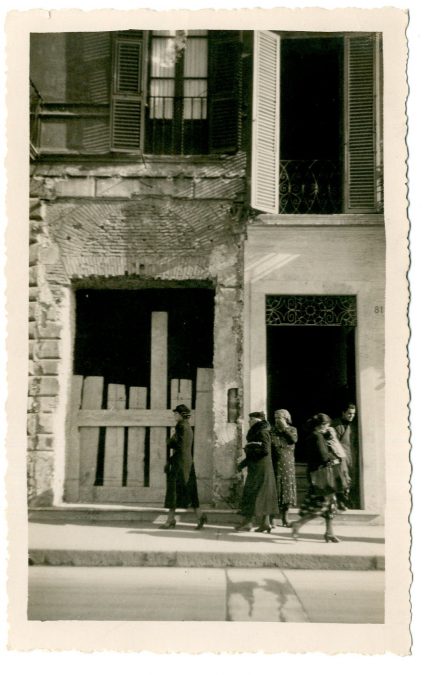
06b Ascarelli
The closed and barred shop owned by Regina Ascarelli in 1940. It was reopened in the post-war period and continued its activities until 1969. Lattes-Ascarelli Family Private Archive, Roma / Fondazione Museo della Shoah, Roma
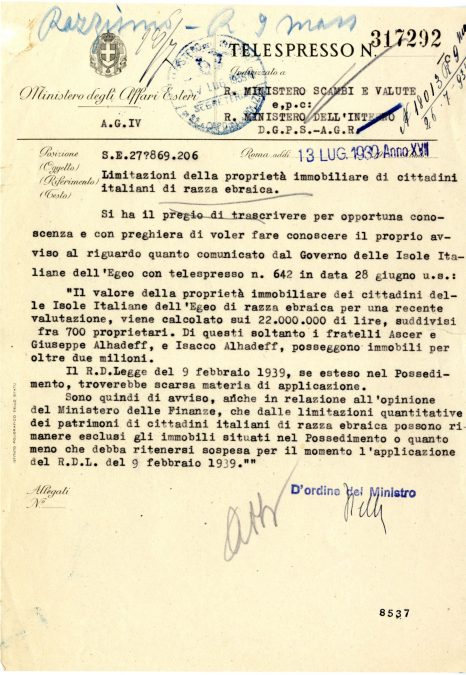
07a Rodi
Investigations into Jewish property were also carried out on the island of Rhodes. Here, the cases concerning the Alhadeff brothers (Ascer and Giuseppe) and Isacco Alhadeff are highlighted. Archivio Centrale dello Stato, Roma
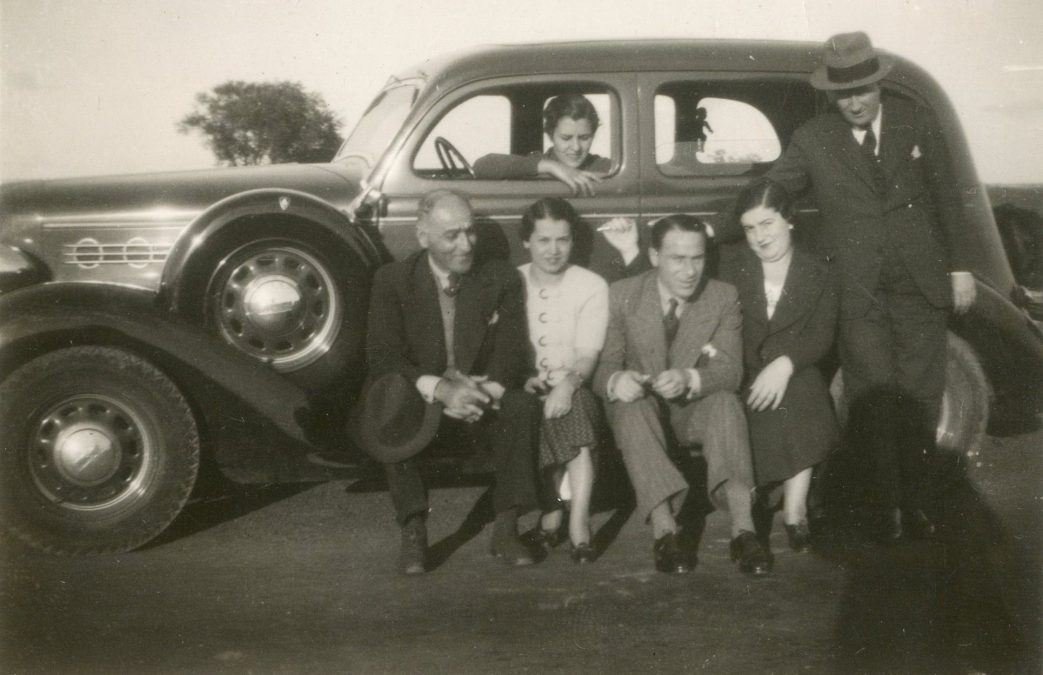
07b Rodi
In this picture, taken in 1936, we see Isaac Alhadeff (seated) and his daughter Sarah (inside the car) with her husband Robert Barcilon (seated). Jacob Isacco ‘Haco’ Alhadeff (1879-1955) was the founder of the Isaac Alhadeff bank. After the promulgation of the...
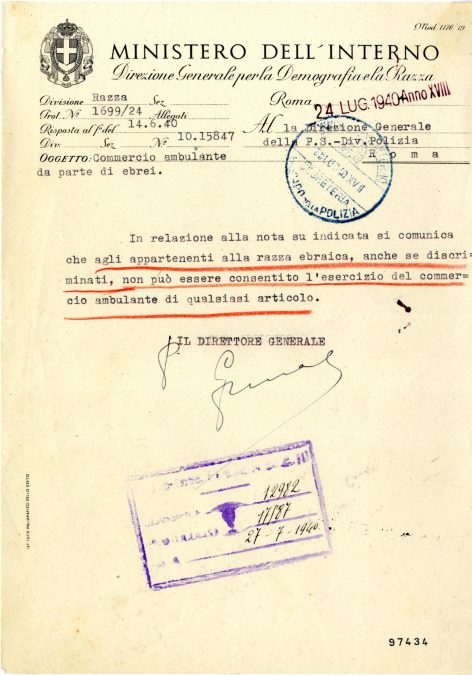
08 Ambulanti
Between June and July 1940, it was decided that Jews could no longer work as street vendors, as communicated by the Directorate General for Demographics and Race to the Public Security Department. The prohibition applies to the poorest layers of the Jewish...
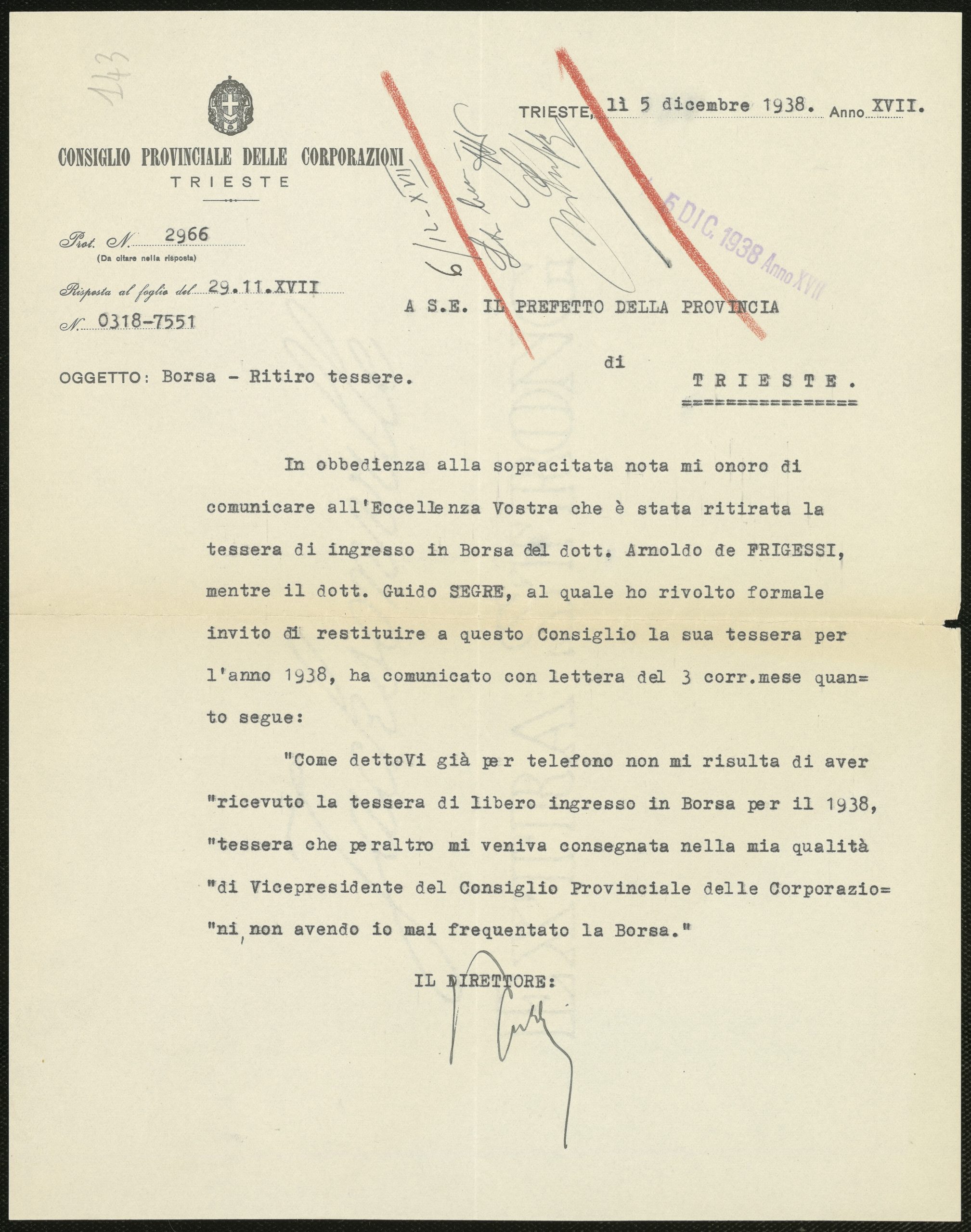
09 Borsa
Trieste, autumn 1938. The Territorial Council of Guilds prohibits Jews from entering the Stock Exchange. Archivio di Stato, Trieste
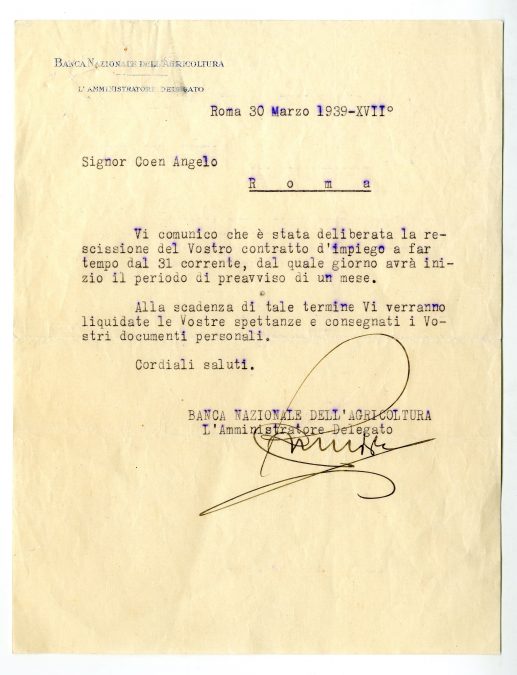
10 Coen
Rome, 30 March 1939. Letter of dismissal received by Angelo Coen (1900-1963), employed by the National Bank of Agriculture (see Art. 13 of Decree-Law of 17 November 1938, in which it is forbidden for ‘Managers of banks of national interest’ to employ people belonging...
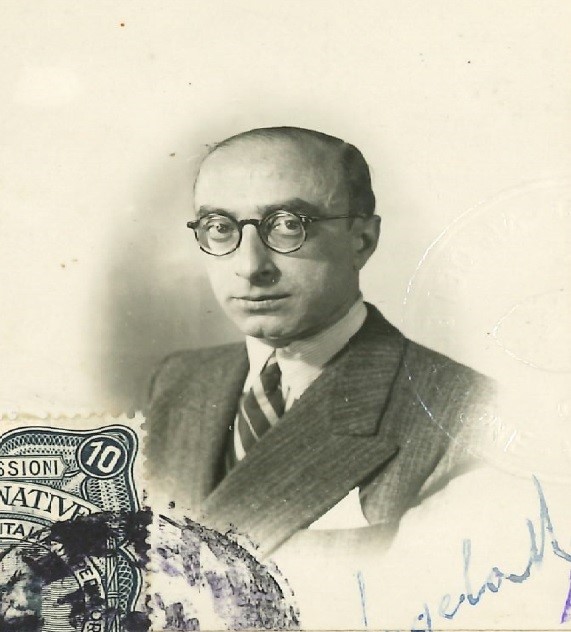
11 Coen
Angelo Coen in 1943. Raffaele Coen’s Private Archive, Roma / Fondazione Museo della Shoah, Roma
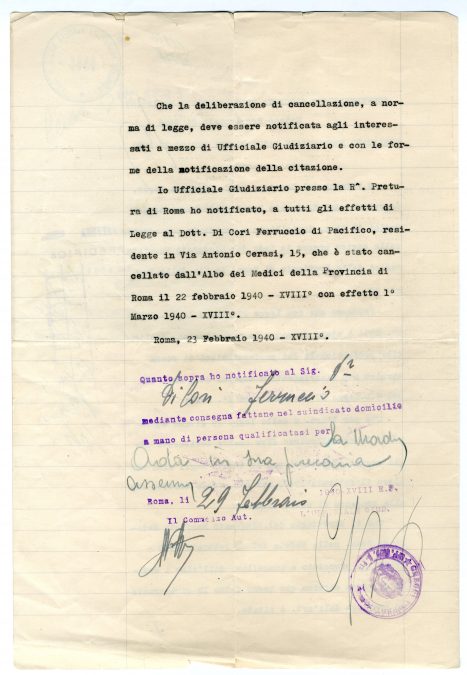
12a Di Cori Roma 12b Di Cori
Rome, 23 February 1940. Cancellation notification from the doctors’ register of Ferruccio Di Cori (1912-2008), because of ‘Jewish race’ (see Law No. 1054 of 29 June 1939). Ferruccio’s registration had been on hold since the end of 1938 pending a decision. However, in...
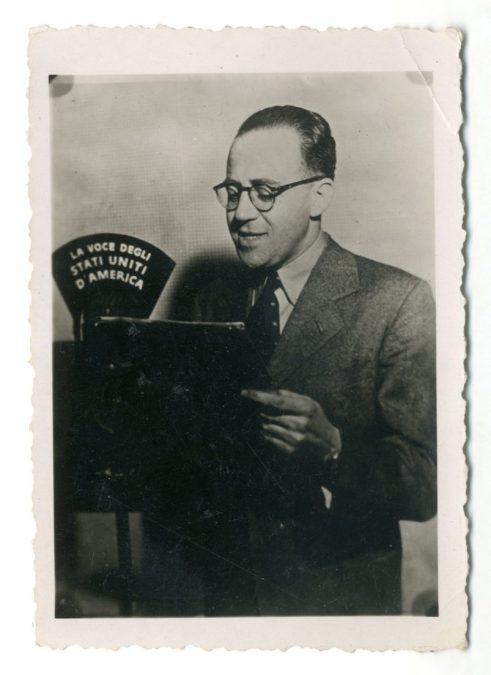
12c Di Cori 12d Di Cori
Two photos of Ferruccio Di Cori: the first is taken in 1936, a few days before he took a degree in Medicine and Surgery; the second in 1947 in New York, where he would specialise in psychiatry. Fondazione Museo della Shoah, Roma Fondo Serena Viterbo
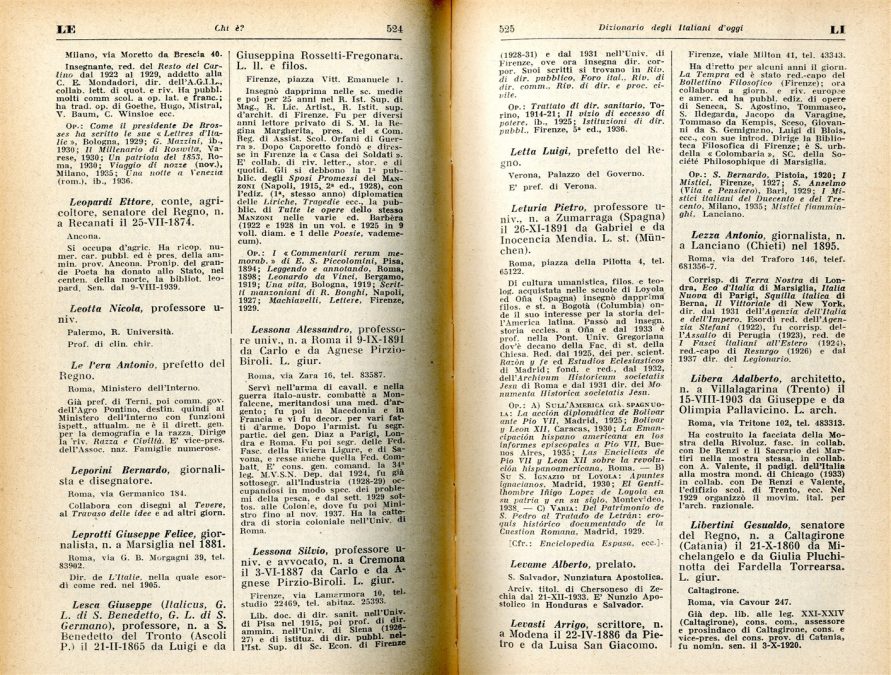
13a Chi è 13b
The expulsion of Jews from almost all fields of work is also evident in the amendments included in the ‘Dictionary of today’s Italians’. Here, facing each other, the 1936 edition of ‘Who’s Who’ with university professors, senators, painters, engineers, and lawyers...
Browse through the chapters of the exhibition
Next chapter
Previous chapter
